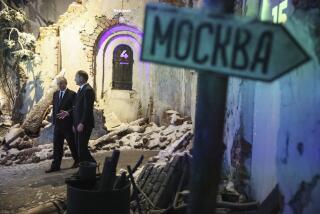Chernobyl’s Legacy
- Share via
The April accident at the Soviet Union’s Chernobyl nuclear-power plant killed at least 30 people and injured many more. As often happens with tragedy on that scale, it has pushed the Soviets and others toward something that they should have done before: in this case the creation of a new international system for quick notification of neighboring nations when an accidental release of radiation occurs.
The Soviet government’s initial reaction to the reactor fire at Chernobyl was not to sound the warning to other nations in the path of the radio-active cloud, but to deny the seriousness of the accident. Eventually the Kremlin was more forthcoming, but by that time radioactivity had spread over a large portion of Europe.
The incident dramatically illustrated the fact that nuclear safety is not just the business of the nation in which an accident occurs. When an accidental release of radioactivity occurs, other countries have a right to know immediately.
Legal experts from 56 countries have been meeting in Vienna under the auspices of the International Atomic Energy Agency to discuss the notification issue. Sources involved in the talks report that a consensus has emerged on early notification of nuclear accidents--whether the accidents involve civilian nuclear-power plants, military-production reactors or even nuclear-propulsion units aboard warships and submarines.
Both the United States and the Soviet Union are part of that consensus. However, the great powers are said to oppose extension of the notification requirements to atmospheric release of radioactivity from nuclear-weapons tests.
If remaining obstacles to an agreement can be overcome, the world will have taken a major step toward the sane handling of a major problem. Since Chernobyl, the need for a global pact on nuclear notification has become even more obvious.
The West German state of Saarland complained this week that France had delayed reporting a fire that broke out recently at a giant nuclear plant at Cattenom, six miles from the West German border. The French, who seemingly have an excellent nuclear-safety record, say that it was a minor fire that was extinguished after 15 minutes.
A West German politician may have overstated the case several weeks earlier when he said, “If Cattenom were to have an accident on the scale of Chernobyl, the whole of the Saarland, Alsace, Lorraine and part of the Rhineland would be uninhabitable forever.” But German concerns are understandable.
The Union of Concerned Scientists meanwhile has charged that eight of this country’s licensed reactors “are extremely susceptible to serious accidents”--an allegation that is denied by the nuclear industry and government regulators.
In Britain, the Chernobyl accident has refocused attention on the Sellafield nuclear-reprocessing plant, only 90 miles from Ireland, which routinely discharges radioactive wastes into the Irish Sea. According to a parliamentary report issued in March, the plant “is the largest recorded source of radioactive discharge in the world.”
An international covenant is needed not just to formally oblige the Soviet government to come through with early notification in the event of radiation accidents, but to overcome the cover-up instinct in other countries as well. The progress at the Vienna talks is welcome news.
More to Read
Sign up for Essential California
The most important California stories and recommendations in your inbox every morning.
You may occasionally receive promotional content from the Los Angeles Times.













